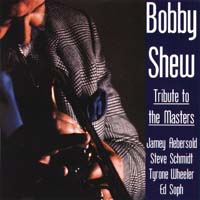
Tribute to the Masters
Bobby Shew
As the old saying goes, it's not what you play, but who plays it that helps determine the artistic value of music. I don't know who originally said that but I would say they were pretty well tuned into Jazz music and the creative process in general. Toshiko Akiyoshi used this saying in introducing her big band during the time I played on it and I have always remembered it, I guess mostly because it made sense to me. Well, lucky me to have this bunch of guys participating with me on this recording. Each one of them made long drives or flights in order to be there. I did not ask them how much work they turned down to make these sessions.
Steve Schmidt is an old friend and cohort from Cincinnati. We have had the good fortune to have worked many times over the past decade or so including the recording of one of my favorite earlier albums, "Round Midnight" (MOPRO M-111). Steve is one of the best... really sensitive and impeccable. He's quite easy for me to play with and it was obvious that the other musicians felt the same way.
Tyrone Wheeler is one of the bright young stars of the new breed of players coming up. I first played with him during one of the Jamey Aebersold Summer Jazz Workshops where we were both acting as faculty. He's got unbelievable chops, plays incredibly creative solos but above all, he really gets in the "Pocket" with his feel. That's where it's at for me!!
Ed Soph... well, he is the master of putting it all together. He is almost too good if that is possible. He will keep you honest, that's for sure. No time for dozing off when you play with him. He has a great sensitivity to horn players and always seems to know precisely what to do to make it comfortable for us. We were all so lucky he was able to fly in to do the album.
Of considerable interest here is the presence of Jamey Aebersold (Papa). If you have not had the opportunity to meet and work around this man, I would venture a guess that you "haven't lived". He has single-handedly done perhaps more than any other person I know to forward the teaching of and respect for jazz music. He is extremely generous with spreading his knowledge as well as all of his teaching materials in the form of publications and the now-famous "Play-A-Long" albums. I know of very few musicians involved in jazz who do not possess at least a few of these albums. I think at last count there were 64 volumes. Whew!! How on earth he finds the time and energy to do it is beyond me. As I have said, you have to try to find a way to be around him for a few days or a week... it will blow you away. It is a real shame that in spite of all he has done for the educational side of jazz, he has not really exposed his own playing skills to the world and I thought it would be high time for that to happen. The guy can really play! At the summer camps, we are afforded the occasional opportunity to hear him play alto sax, but I needed him on tenor to recapture the original sound on tunes like "Nica's Dream", "Tiny Capers", "Whisper Not", etc. As you will no doubt notice, he is a hell of a tenor player with a quite unique sound and touch on the horn, a bit reminiscent of the great James Moody. It was loads of fun playing next to him and hearing those tasteful solos pop out take after take. Scary! I am sure you will dig hearing him play. It goes without saying that he certainly deserves to be heard.
I really hope you enjoy this recording and listen to it over and over. We had a great time! We wish young Jamey great success with this new label. We are certain he will put out only high quality music worthy of your listening efforts. Enjoy!!
Bobby Shew April/1995
1. Nica's Dream (9:39) / (1956) Music by Horace Silver. A very well know Silver tune
with alternating latin-swing rhythms, melodic minor scales, and a pedal point used in the bridge. Horace recorded this tune with Art Blakey and the original Jazz Messengers. Jamey sounds very Hank Mobleyish on tenor. Many well known artists have recorded Nica's Dream.
2. Whisper Not (10:11) / (1957) Music by Benny Golson. Lyrics added by Leonard Feather. Bobby plays flugelhorn, along with Jamey's tenor sax, producing a classic sound. This is a very relaxed, easy going, minor-keyed tune with an intriguing melody. Everyone gets a chance to shine on this beautiful rendition! Nice versions of this tune have been recorded by Wynton Kelly, Wes Montgomery, Oscar Peterson, Milt Jackson, Roy Hargrove and Art Blakey.
3. Rhythm-A-Ning (6:36) / (1956) Music by Thelonious Monk. This is a popular melody to "Rhythm" changes recorded several times by Monk in the late 50's. Virtually every "Heavy" has recorded one of the many popular melodies to these changes. Anthropology, I Got Rhythm, Salt Peanuts, The Theme and Thriving From A Riff are just a few famous heads to these changes. There are over 200 tunes based on "Rhythm" changes. The horn solos work the changes for all they are worth! A burning recording!
4. In Your Own Sweet Way (7:43) / (late 50's) Music by Dave Brubeck. Bobby chose a little faster tempo than Mile's popular version from the 60's. Great song writing can sound nice at various tempos.
5. Confirmation (6:04) / (1946) Music by Charlie Parker. One of the more difficult up tempo melodies by Bird. Classic recordings of this tune are from Phil Woods, Stan Getz, Charlie Parker, Sonny Stitt, Art Blakey and Bud Powell.
6. Tiny Capers (6:12) / (1954) Music by Clifford Brown. Clifford's original manuscript was in E flat however Jack Montrose's arrangement on the original recorded version is in B flat. Bobby choose to do this tune in B flat. The only other recorded version of this tune is by Stanley Turrentine on the Blue Note label.
7. In A Sentimental Mood (8:15) / (1935) Music by Duke Ellington, Irving Mills & Manny Kurtz. Many classic recordings of this tune exist. Duke recorded this favorite of his many times. Bobby plays very soulfully on the flugelhorn and Duke would have enjoyed this tribute.
8. This I Dig Of You (5:24) / (1960) Music by Hank Mobley. Introduced by Hank Mobley on the Soul Station album. Ralph Moore and Vincent Herring recently recorded this tune.
9. A Night In Tunisia (9:39) / (1944) Music by Dizzy Gillespie and Frank Paparelli. A Gillespie original alternating a Latin feel with swing in the head, and in the present version has a four bar break following the interlude as Charlie Parker recorded it rather than the two bars favored by the composer. Words by Jon Hendricks. Introduced but never recorded by Earl Hines and His Orchestra. First recorded in 1945 by Boyd Raeburn and His Orchestra featuring Dizzy Gillespie. This tune has been recorded by all the greats, among them Art Blakey, Miles Davis, Stan Getz, Dexter Gordon, Sonny Rollins and Charlie Parker. Bobby counts off a roaring tempo and the rhythm section locks in place from beat one.
Contents ©2020 Bobby Shew. Website by Jim Ahrend.




